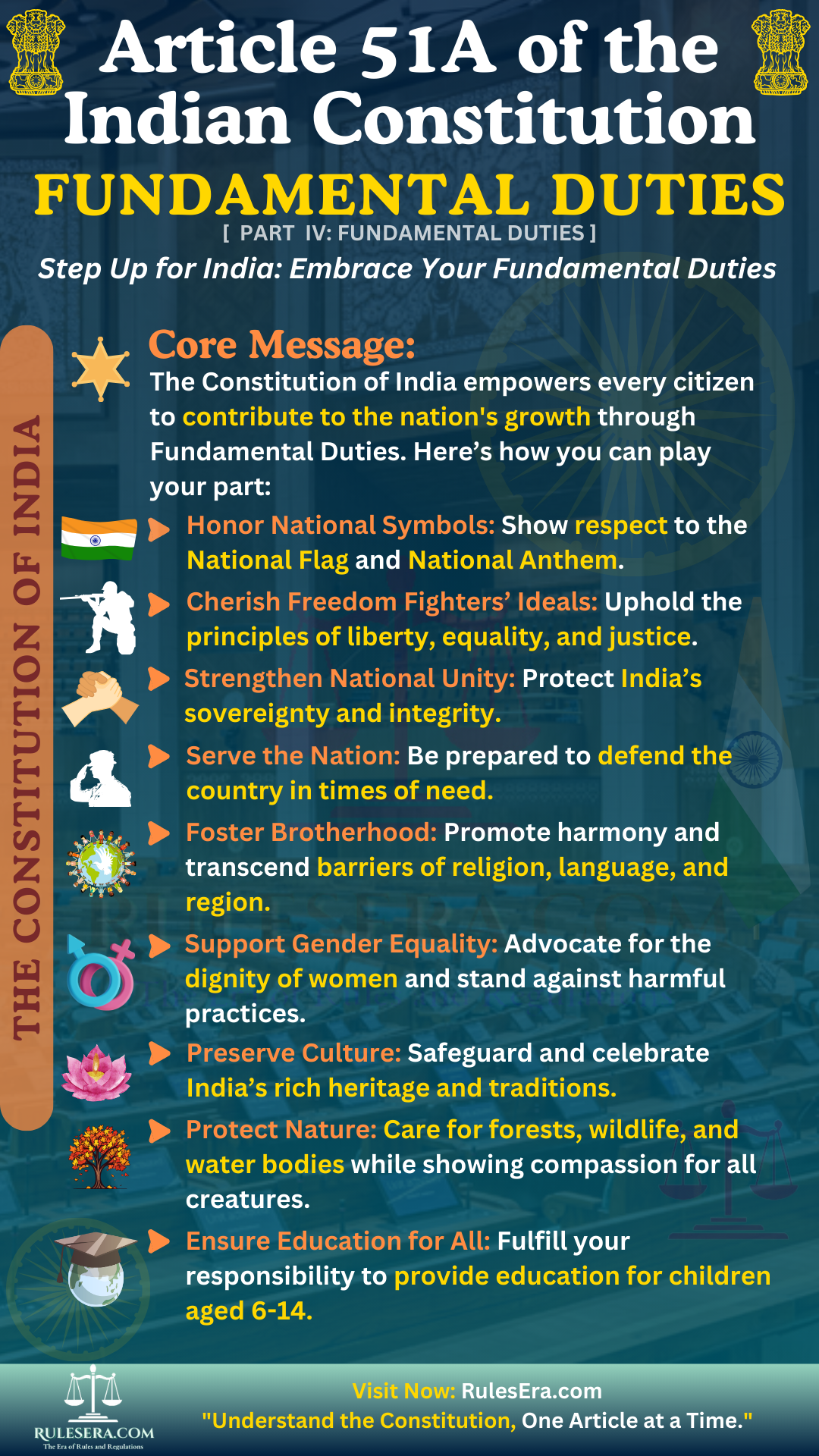Part IVA: Fundamental Duties
Article 51A: Fundamental Duties

--- Original Article ---
It shall be the duty of every citizen of India—
- (a) to abide by the Constitution and respect its ideals and institutions, the National Flag and the National Anthem;
- (b) to cherish and follow the noble ideals which inspired our national struggle for freedom;
- (c) to uphold and protect the sovereignty, unity and integrity of India;
- (d) to defend the country and render national service when called upon to do so;
- (e) to promote harmony and the spirit of common brotherhood amongst all the people of India transcending religious, linguistic and regional or sectional diversities; to renounce practices derogatory to the dignity of women;
- (f) to value and preserve the rich heritage of our composite culture;
- (g) to protect and improve the natural environment including forests, lakes, rivers and wild life, and to have compassion for living creatures;
- (h) to develop the scientific temper, humanism and the spirit of inquiry and reform;
- (i) to safeguard public property and to abjure violence;
- (j) to strive towards excellence in all spheres of individual and collective activity so that the nation constantly rises to higher levels of endeavour and achievement;
- (k) who is a parent or guardian to provide opportunities for education to his child or, as the case may be, ward between the age of six and fourteen years.
1. Ins. by the Constitution (Forty-second Amendment) Act, 1976, s. 11 (w.e.f. 3-1-1977).
2. Ins. by the Constitution (Eighty-sixth Amendment) Act, 2002, s. 4 (w.e.f. 1-4-2010).
Explanation
Article 51A, introduced by the Constitution (Forty-second Amendment) Act, 1976, outlines the Fundamental Duties of citizens of India. These duties represent the moral obligations expected from each citizen to contribute to the nation’s well-being and development. Unlike fundamental rights, which are enforceable, fundamental duties are non-justiciable but hold significant value in creating an informed, responsible, and harmonious society. The addition of fundamental duties was inspired by various international constitutions, particularly the former Soviet Union.
Clause Headings and Explanation with Real-Life Examples
- 51A(a): Abide by the Constitution and Respect National Symbols: Every citizen must respect the Constitution of India and uphold its principles. This clause mandates respect for national symbols like the National Flag and the National Anthem, fostering a sense of national pride and unity.
- 51A(b): Cherish and Follow Noble Ideals from the Freedom Struggle: Citizens are encouraged to honor the sacrifices and ideals of the freedom fighters who fought for India’s independence. The clause reinforces the need to uphold values like liberty, equality, and non-violence.
- 51A(c): Uphold Sovereignty, Unity, and Integrity of India: This clause emphasizes the importance of safeguarding the nation's sovereignty and territorial integrity, promoting a spirit of unity among all citizens.
- 51A(d): Defend the Country: Citizens are expected to serve the nation when called upon, especially during emergencies, wars, or disasters. This duty reflects the collective responsibility of national defense.
- 51A(e): Promote Harmony and Renounce Practices Detrimental to Women’s Dignity: Citizens should foster unity by transcending religious, linguistic, and regional diversities. This duty also calls for eliminating practices that undermine the dignity of women, emphasizing gender equality.
- 51A(f): Preserve Heritage: The rich cultural diversity of India is to be valued and protected. Every citizen has the duty to preserve the unique heritage that constitutes India’s composite culture.
- 51A(g): Protect the Environment: Citizens must protect the natural environment, including forests, wildlife, and water bodies, and demonstrate compassion for all living beings.
- 51A(h): Develop Scientific Temper and Spirit of Inquiry: Citizens are encouraged to cultivate a scientific mindset, promote rational thinking, and engage in continuous inquiry and reform.
- 51A(i): Safeguard Public Property: Citizens should protect public property and avoid any form of violence or destruction.
- 51A(j): Strive for Excellence: Citizens are called to pursue excellence in all spheres of life, both individually and collectively, thereby contributing to national progress.
- 51A(k): Provide Education to Children: Added by the Constitution (Eighty-sixth Amendment) Act, 2002, this duty obligates parents and guardians to ensure that children between the ages of six and fourteen are provided with opportunities for education.
*Real-life example:* Citizens are required to stand in respect during the national anthem in public events, reflecting reverence towards national symbols.
*Real-life example:* Celebrations of national days like Independence Day and Republic Day emphasize the ideals from the freedom struggle.
*Real-life example:* Citizens coming together to contribute during national crises, such as natural disasters, reflects their commitment to national unity.
*Real-life example:* Individuals joining disaster relief efforts during floods or earthquakes are actively defending the country by serving fellow citizens.
*Real-life example:* Anti-gender-violence campaigns and initiatives to protect women's rights represent this duty.
*Real-life example:* Citizens participating in cultural heritage conservation programs like monument restoration and traditional festivals.
*Real-life example:* Participation in environmental campaigns like tree plantation drives or reducing plastic use showcases a commitment to environmental protection.
*Real-life example:* The growing emphasis on STEM education in schools and the promotion of scientific literacy exemplifies the application of this duty.
*Real-life example:* Anti-vandalism campaigns and initiatives to protect public infrastructure reflect efforts to safeguard public property.
*Real-life example:* Citizens striving for excellence in fields like sports, technology, or governance contribute to national pride and achievement.
*Real-life example:* Government campaigns promoting universal education, such as Sarva Shiksha Abhiyan, support parents in fulfilling this duty.
Amendments
The Constitution (Forty-second Amendment) Act, 1976, introduced the concept of fundamental duties.
The Constitution (Eighty-sixth Amendment) Act, 2002, added Clause (k), emphasizing the right to education for children.
Historical Significance
The introduction of fundamental duties was in response to growing concerns about indiscipline and lack of civic responsibility among citizens during the Emergency period in 1976. These duties align with international standards like the Universal Declaration of Human Rights, underscoring India's commitment to responsible citizenship. These duties form an integral part of creating a responsible and conscientious society.